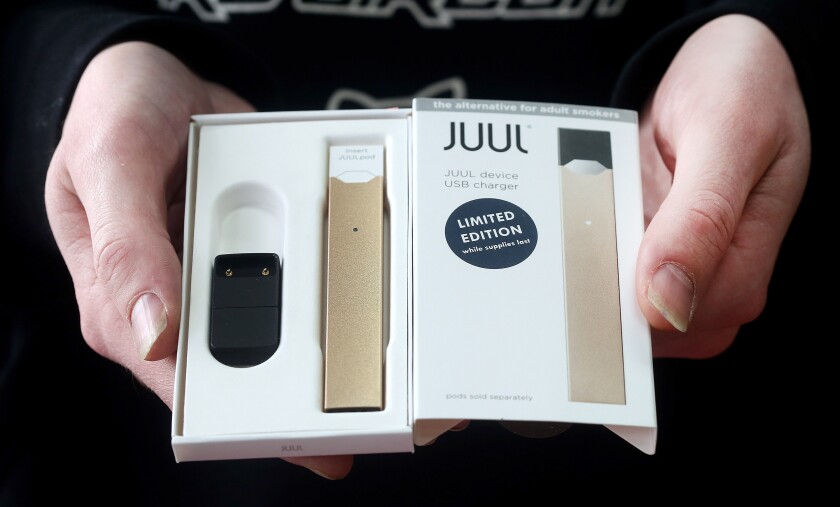ST. PAUL — Minnesota has reached a $60.5 million settlement with two companies for their alleged deceptive practices in marketing e-cigarettes to youth and young adults.
E-cigarette Juul Labs and former investor Altria, a major tobacco company, will have to pay the multimillion-dollar settlement and cease marketing to children and young adults in Minnesota, under settlement details released Wednesday, May 17. Juul will also have to stop selling flavored products.
ADVERTISEMENT
At a news conference announcing the details of the settlement, Attorney General Keith Ellison said the settlement sends a message that Minnesota is prepared to hold companies accountable for their actions.
“This is a notice to all companies looking to addict kids,” Ellison said. “If you try to do this in Minnesota, not only are we going to sue you, we’re going to take you to court and hold you accountable — and you’re going to pay.”
E-cigarette or “vape” makers have come under scrutiny in recent years as youth vaping boomed, driving high rates of nicotine addiction among minors. Health officials blame e-cigarettes flavored like fruit or other non-tobacco flavors for making nicotine more accessible to kids.

Minnesota Department of Health Tobacco Control Manager Laura Oliven said youth tobacco use dropped to single-digit percentage levels following the 1998 Big Tobacco lawsuit settlement. But vaping caused addiction rates to roar back in recent years.
“It’s two decades of work erased in two to three years thanks to the marketing and intentional marketing of Juul,” Oliven said.
Under the settlement, Juul and Altria will pay Minnesota $60.5 million over the next eight years. A third of that must be paid in the next 30 days, and 60% must be paid in a year. Ellison’s office said the settlement total is greater than Juul’s gross revenue in Minnesota from 2015-2021.
Part of the settlement will go to covering Minnesota’s legal costs. Juul and Altria will have to pay $8.6 billion for case costs and $8.9 billion in legal fees.
ADVERTISEMENT
The companies will also have to publish internal documents related to the lawsuit in a public depository, something Ellison would help the public learn more about what was happening behind the scenes at the companies.
Minnesota is just one of many states that has brought a lawsuit against Juul Labs for alleged marketing to youth and young adults with flavored e-cigarettes. The company has settled lawsuits with 48 states and territories and has provided more than $1 billion for youth nicotine and quitting programs, a company spokesman said.
In April, the company entered a $462 million settlement with six different states. In late 2022, Juul announced a resolution in 5,000 cases brought by 10,000 plaintiffs. Juul in a statement said it hopes to move forward from the litigation and place more emphasis on its products' potential to help people quit smoking cigarettes.
“Resolution of issues from the company’s past and its historical legal challenges has remained a critical priority to secure certainty for our future,” the statement said. “As we reach total resolution of the company’s past, we are focused on our path forward to maximize the value and impact of our product technology and scientific foundation.”
Altria is named in the lawsuit because it invested $12.8 billion in Juul in 2018, but backed out in 2023 after the vapemaker’s value plummeted amid lawsuits and public backlash.
Minnesota brought its lawsuit against Juul in 2019 and it went to trial this March. Ellison announced the settlement with the e-cigarette maker and tobacco company as a three-week trial approached its end last month. The details of the settlement were sealed until today.
So far, Minnesota is the only state that sued the companies and ended up taking them to trial, said the attorney general, who noted that Minnesota’s $60.5 million settlement is the largest per capita.
ADVERTISEMENT
To ensure the money from the settlement goes toward programs aimed at addressing youth nicotine addiction, lawmakers are advancing a bill that sets up rules for the settlement.
Rep. Kaohly Her, DFL-St. Paul, said that bill will likely be included in a health and human services package Senate and House lawmakers are finalizing in a conference committee.
Follow Alex Derosier on Twitter or email aderosier@forumcomm.com .


















